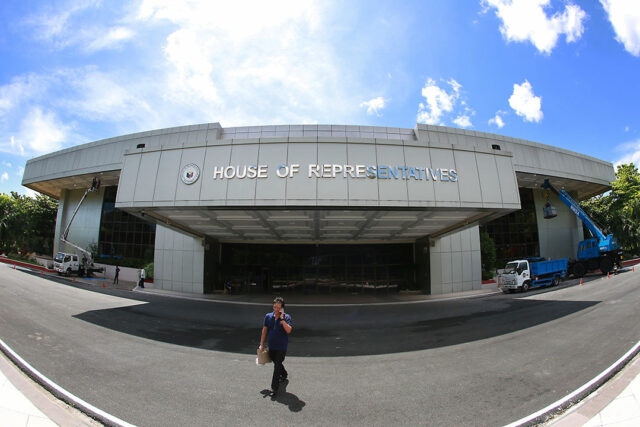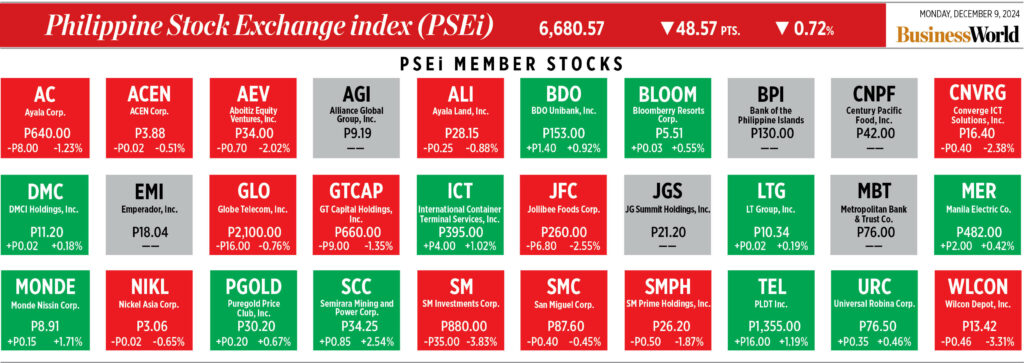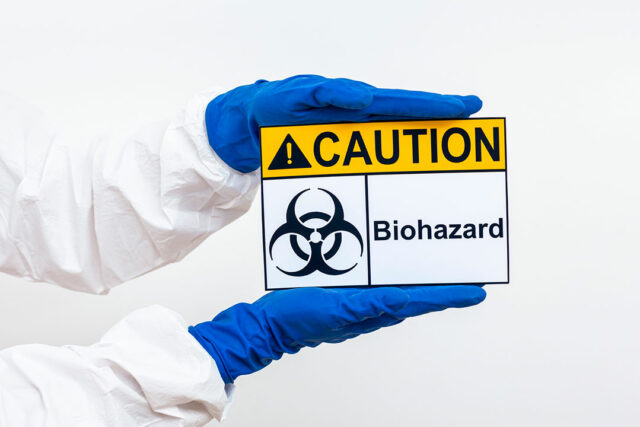Denmark eyes more energy projects in Philippines, keen on defense deals
By John Victor D. Ordoñez, Reporter
DENMARK is keen on boosting onshore and offshore energy investments in the Philippines, according to its foreign minister, which could boost the Southeast Asian nation’s efforts to diversify its power mix amid a global push for renewable energy (RE).
The Nordic country is also interested in exploring defense partnerships with Manila, Danish Foreign Minister Lars Løkke Rasmussen told a news briefing in Makati City near the Philippine capital on Monday.
“The fact that the main infrastructure partners have quite big investments, offshore investments in the Philippines, I think there’s even bigger potential also onshore,” he said. “Your government has made very good conditions for offshore wind investments in the Philippines and if you copy-paste that to onshore, you could unlock a huge potential.”
Last year, Copenhagen Infrastructure New Markets Fund, an affiliate of Copenhagen Infrastructure Partners (CIP), became the first fully foreign-owned entity awarded with wind energy service contracts by the Department of Energy (DoE) after the Philippines opened up the RE sector to full foreign ownership.
The offshore wind projects are in Camarines Norte and Camarines Sur, with capacity projected at 1,000 megawatts (MW); in Northern Samar (650 MW); and Pangasinan and La Union (350 MW).
“Again, Danish businesses are keen to invest and will drive your green transition,” Mr. Rasmussen said. “It’s about avoiding corruption… and the Philippines has made a lot of progress regarding all these issues.”
“Denmark is a leader in wind energy,” Calixto V. Chikiamco, Foundation for Economic Freedom president, said in a Viber message. “Danish companies are already investing in the Philippines due to the liberalization of RE projects, opening the sector to 100% foreign ownership.”
Denmark’s top envoy said his country backs negotiations between the European Union (EU) and the Philippines on a free trade agreement, which is expected to wrap up by 2027.
Trade Undersecretary Allan B. Gepty has said the government’s internal target is to conclude trade negotiations with the EU by 2026. This is to ensure that there would be no gap in trade privileges should the Philippines lose EU concessions by graduating to upper middle-income status.
The Philippines is part of the EU’s Generalized Scheme of Preferences Plus (GSP+), a special incentive for low and lower middle-income countries. The country enjoys zero duty on more than 6,274 Philippine-made products.
CIP in May launched its light detection and ranging (LIDAR) system, which uses laser technology to measure wind speeds to assess an area’s capacity to generate wind energy, for its planned offshore wind project in Camarines Sur.
The Board of Investments had given CIP’s projects green lane certificates of endorsement to fast-track the processing of permits.
Denmark Ambassador to the Philippines Franz-Michael Mellbin has said the Philippines could develop robust renewable energy projects due to its diverse natural resources such as wind, solar and biomass.
The Philippines is under pressure to find other sources of indigenous energy with the imminent depletion of the Malampaya gas field, which supplies power plants accounting for a fifth of all power generated in the Philippines. The gas field is expected to run out of easily recoverable gas by 2027.
The government aims to raise the share of renewable energy in the country’s energy mix to 35% by 2030 and to 50% by 2040 from 22% now.
“The potential for sustained Philippine economic growth is immense,” Mr. Rasmussen said. “I commend the government’s effort to continuously improve the business environment and we want to assist and help to drive this growth.”
MARITIME TIES
At the same briefing, Philippine Foreign Affairs Secretary Enrique A. Manalo said both countries are eyeing more cooperation between their defense industries.
“I also raised the hope that we could collaborate more on the maritime area in terms of maritime security, promoting international law… and we also consider the possibility of defense cooperation in the future,” he said.
Mr. Rasmussen said he wants both countries’ defense industries to carve out long-term ties. “Talking about defense, I think we have a business community and defense industry that have certain competencies and strongholds, which are probably needed in the Philippines to build up the necessary capacity.”
Philippine and Chinese coast guards have repeatedly clashed in the South China Sea, accusing each other of aggressive behavior involving their ships and of damaging the marine environment.
China claims almost the entire sea, a conduit for more than $3 trillion of annual ship-borne commerce. The Permanent Court of Arbitration in 2016 said China’s claims had no legal basis, a ruling Beijing rejects.
The EU is keen on boosting ties with the Philippines in diplomatic efforts to uphold international law in the South China Sea amid its dispute with Beijing, EU External Action Service Managing Director for Asia and the Pacific Niclas Kvarnström told a news briefing in Manila last week.
Last week, the Philippines filed a diplomatic protest against China after a Chinese Coast Guard vessel fired water cannons at a Philippine ship carrying supplies for troops stationed around Scarborough Shoal.
China has controlled the shoal, which falls within the Philippines’ exclusive economic zone and is claimed by several other countries, since 2012 after maintaining constant coast guard presence there, according to the Asia Maritime Transparency Initiative.
“Minister Rasmussen’s clear expression of solidarity with the Philippines and support for our position on the South China Sea indicates Denmark’s principal status on security and stability,” Mr. Manalo said.
Bill vs chemical weapons approved on final reading
THE PHILIPPINE Senate on Monday approved on final reading a bill that seeks to bar the production and development of chemical weapons in the country, in line with its commitments to an international treaty banning these.
Twenty-two senators unanimously approved Senate Bill No. 2871, which bars the manufacture and stockpiling of chemical weapons.
Under the measure, the Anti-Terrorism Council, which will be designated as the Philippine National Authority on the Chemical Weapons Convention, will ensure that chemical weapons are not produced.
The executive secretary will head the council, which is tasked to look into entities engaged in developing chemical weapons.
The Philippines ratified the Chemical Weapons Convention treaty in 1995, which bans the stockpiling and large-scale development of chemical weapons.
The bill defines chemical weapons as “toxic chemicals, munitions and devices designed to cause death or other harm through the release of toxic properties.”
“Today, this institution demonstrates its dedication to global disarmament and nonproliferation of weapons of mass destruction, and strengthens existing regulatory policies to prevent utilization and diversion of chemicals for terrorism and nonpeaceful purposes,” Senate President Pro-Tempore Jose “Jinggoy” P. Estrada, Jr. told the Senate floor after the bill’s approval.
The measure will ban the domestic and cross-border transfer of chemicals linked to chemical warfare and without permits.
People found guilty of developing, acquiring, stockpiling, retaining and transferring chemical weapons may face life in prison.
People who finance the development of these weapons may face at least 20 years of jail time and a fine of P500,000 to P1 million.
“[That] It is imperative for our country to boost our legislative efforts through measures that will ensure prosecution against those who violate the convention, is an understatement,” Senator Ronald M. dela Rosa said in a speech after the bill’s passage.
The Philippine Senate in 2021 ratified the United Nations Treaty on the Prohibition of Nuclear Weapons, making the Philippines the 53rd nation to adopt it. The treaty, signed by 86 countries, took effect after it was ratified by at least 50 states.
The treaty bars nations from developing, testing, producing, manufacturing, transferring, possessing, stockpiling, using or threatening to use nuclear weapons.
Philippine Foreign Affairs Secretary Enrique A. Manalo earlier said Manila’s global peace-building efforts makes it qualified to pursue a nonpermanent seat in the 15-member United Nations Security Council.
Elections for new council members will be held in 2026.
“Finally, we are one step closer to fulfilling our commitment of enacting national legislation to fully implement provisions under the Chemical Weapons Convention, and to join the international community in the ongoing efforts to completely eliminate chemical weapons,” Mr. Estrada said. — John Victor D. Ordoñez
House bill that seeks to criminalize troll farms, disinformation campaigns filed
A BILL that seeks to combat election-related disinformation by outlawing the operations of troll farms has been filed at the Philippine House of Representatives.
Filed on Dec. 5, House Bill No. 11177 imposes a jail term of as long as 12 years and a fine of as much as P2 million on violators, while also disqualifying candidates who willingly benefit from disinformation campaigns.
Groups found operating troll farms face fines of as much as P10 million and will have their business permits and licenses revoked.
The measure mandates the creation of a task force dedicated to investigating and monitoring troll farms and prosecuting those behind them.
“Troll farms are… systematic tools designed to deceive voters and distort democracy,” Party-list Rep. Margarita B. Nograles-Almario, who authored the bill, said in a statement. “This bill is our commitment to ensuring that the voice of the Filipino people remains genuine and untainted by lies.”
The World Economic Forum in a 2024 report cited disinformation as the “most severe global risk” in the next two years because it could undermine the legitimacy of newly elected governments and lead to a highly politically polarized citizenry.
Social media companies that fail to remove deceptive content from verified complaints on their platforms within a day could get fined P1 million to P5 million per violation, according to the bill.
“Technology should be a force for empowerment, not manipulation,” Davao Oriental Rep. Cheeno Miguel D. Almario, a co-author of the bill, said in the same statement. “The bill is a proactive step to ensure that innovation strengthens, rather than weakens, our democracy.”
Informants who report troll farm activities and their locations will be protected under a 2021 Whistleblower Protection law, according to the bill.
Schools should also implement education programs to promote voter awareness and critical thinking, preventing students from falling victim to disinformation, it added.
“Education is a long-term solution. By equipping the public with the tools to recognize and combat disinformation, we can nurture a more informed and responsible electorate,” Ms. Almario said. — Kenneth Christiane L. Basilio
Gov’t told to uphold UN Bangkok Rules ahead of Mary Jane Veloso’s repatriation

THE Commission on Human Rights (CHR) reminded the government to uphold the United Nations (UN) Bangkok Rules as the country anticipates the return of Mary Jane F. Veloso, who has spent the last decade in an Indonesian prison for drug trafficking.
The Bangkok Rules, or the UN Rules for the Treatment of Women Prisoners and Non-custodial Measures for Women Offenders, sought to protect and uphold the dignity of women from their incarceration up to their reintegration, according to the UN.
“This is to ensure that all efforts needed for constitutional actionable steps towards the reformation and possible reintegration of Veloso and the rest of the PDLs (persons deprived of liberty) to mainstream society are actualized,” it said in a statement on Monday.
The commission welcomed her expected return, and lauded President Ferdinand R. Marcos, Jr. and the Department of Foreign Affairs (DFA), noting that “promoting and protecting the dignity of every Filipino will always include our migrant workers, parallel to our foreign policy which also prioritizes the welfare of Filipinos overseas.”
The Filipino overseas worker was sentenced to death in October 2010 and was granted a stay of execution in April 2015. Ms. Veloso, who was caught smuggling 2.6 kilograms of heroin hidden in the lining of a suitcase, was a victim of human trafficking, according to her lawyers.
On Nov. 19, Mr. Marcos and the DFA said the government reached an agreement with its Indonesian counterparts on Ms. Veloso’s return to the Philippines to serve her remaining sentence.
Justice spokesman Jose Dominic F. Clavano IV on Monday said it seems Ms. Veloso’s return gives the Philippines legal and physical custody.
“We think from the actuation and practical agreement signed between the PH government and Indonesian government, there seem to be no conditions imposed…It is up to us to decide on whether or not there should be other steps taken,” he told reporters in mixed English and Filipino.
“Before we thought that legal custody was in Indonesia, it was only physical custody for us, but it seems right now, both legal and physical custody are now with the Philippines,” he added, noting they are eyeing Ms. Veloso’s return to Manila before Christmas.
Indonesia and the Philippines last week signed an agreement on the repatriation of a Philippine woman who was sentenced to death for drug trafficking, an Indonesian government minister said.
Indonesia’s senior minister for law and human rights affairs Yusril Ihza Mahendra and Philippines Justice Undersecretary Raul Vasquez signed the agreement for the repatriation of Ms. Veloso.
Mr. Yusril noted in a Reuters report that Indonesian President Prabowo Subianto instructed to have Ms. Veloso’s case resolved before Christmas, if possible, and have her transferred likely around Dec. 20.
Mr. Yusril said the Philippines agreed on several terms proposed by Indonesia, including respecting the Indonesian court’s sentencing of Ms. Veloso and her status as prisoner in Indonesia.
Indonesia would respect any decision made by the Philippines, including if she was given clemency.
She will be banned from returning to Indonesia, Mr. Yusril added.
Indonesia also said that the agreement was “reciprocal.”
Mr. Yusril said that Philippines had told Indonesia that it would change Ms. Veloso’s death sentence to life imprisonment. — Chloe Mari A. Hufana with Reuters
Kanlaon Volcano erupts
A VOLCANO in central Philippines erupted on Monday, spewing an eruption column of up to 3,000 meters (1.86 miles), the country’s seismology agency said.
The Philippine Institute of Volcanology and Seismology (Phivolcs) said in an advisory it had raised its alert level for Kanlaon Volcano to its third-highest level. The volcano is located in the central provinces of Negros Occidental and Negros Oriental.
“This means magmatic eruption has begun that may progress to further explosive eruption,” Phivolcs said.
The seismology agency had advised local governments to evacuate people living near the volcano. — Reuters
Military pact with Japan OKd on second reading
THE PHILIPPINE Senate on late Monday approved on second reading a resolution calling for concurrence in Manila’s Reciprocal Access Agreement with Tokyo, which would ease the entry of military equipment and troops for combat training between their militaries.
Both countries signed the deal in July amid China’s increased assertiveness in the South China Sea, where Beijing’s overlapping claims conflict with those of several Southeast Asian nations.
A United Nations-backed tribunal based in the Hague in 2016 voided China’s expansive claims in the sea for being illegal. Beijing has ignored the ruling.
Senate President Francis G. Escudero earlier said the Senate can do away with the three-day rule in approving measures since the pact is a treaty. He said the treaty is likely to be approved this week even as lawmakers finalize next year’s national budget.
The Philippines has a visiting forces agreement with the United States and Australia. Tokyo, which hosts the biggest concentration of US forces abroad, has a similar deal with Australia and Britain, and is negotiating another with France.
Japanese Foreign Minister Yoko Kamikawa has said her country’s partnership with Manila is not targeted against any country but aims to boost efforts towards peace and stability in the region.
Tokyo has pledged P611 million in radar systems, inflatable boats and other maritime equipment to boost Manila’s capacity to patrol its maritime territory. — John Victor D. Ordoñez
Civil case vs alleged Marcos ‘crony’ dismissed
THE PHILIPPINES’ anti-graft court has dismissed civil forfeiture cases against the estate of an alleged Marcos, Sr. crony after the Philippine Commission on Good Governance’s (PCGG) withdrew its confiscation charges on their alleged ill-gotten wealth.
In a 33-page resolution, the Sandiganbayan Second Division stated the asset recovery agency decided to no longer pursue its forfeiture action against the estate Eduardo “Danding” M. Cojuangco, Jr. as the state has “recovered majority” of the contested properties.
However, the anti-graft court opted to let the case “remain open” for a contested claim by a private air charter service company, which alleged the state erroneously sequestered one of its aircraft.
“Civil Case No. 0033-A is hereby dismissed with prejudice as between the plaintiff Republic and the defendants therein, due to the withdrawal of plaintiff Republic,” Associate Justice Geraldine Faith F. Econg said in the Dec. 6 resolution.
“The case must remain open until the final disposition of intervenor’s… complaint-in-intervention,” it added.
Civil Case No. 0033-A was lodged by state lawyers due to the alleged anomalous purchase of the United Coconut Planter’s Bank by Mr. Cojuangco in 1975 after “taking undue advantage of his association” to the Marcoses.
In the same resolution, the Sandiganbayan also dismissed Civil Case No. 0033-F, which involved the alleged illicit acquisition of company stocks, after the state withdrew its case for the same reason as the above case. — Kenneth Christiane L. Basilio
Stricter rules on intel funds eyed

A HOUSE of Representatives committee is looking at “strictly” regulating the use of confidential and intelligence funds (CIF), its chairman said on Monday amid issues hounding Vice-President Sara Z. Duterte-Carpio’s utilization of her covert budget.
Manila Rep. Joel R. Chua, who heads the House good government panel, said they are preparing two proposed laws to address “shortcomings” on the policy governing the use of CIF.
He added that “lenient” rules over secret funds could lead to its misuse, just like what is being accused against Ms. Duterte.
Ms. Duterte is being questioned by congressmen for her use of P612.5 million worth of CIF under the Office of the Vice-President’s (OVP) budget in 2022 and the Department of Education (DepEd) in 2023, when she sat as its secretary.
The OVP did not immediately respond to an e-mail seeking comment.
“It’s time to implement stricter rules on the use of confidential funds for confidential expenses,” Mr. Chua told congressmen in Filipino. “We aim to address the seemingly lenient guidelines outlined in Joint Circular 2015-01.”
“Once confidential funds have served their purpose, there is no reason for them not to be disclosed and made transparent,” he added.
The directive allowed the use of secret funds for surveillance and intelligence gathering, according to the joint instruction by the Commission on Audit and the Departments of National Defense, Budget, and Interior and Local Government.
The good government panel is also looking at changing the regulations for disbursement officers of secret funds, said Mr. Chua, noting the need to tweak the bond amounts for its spending.
A special disbursement officer oversees the spending and liquidation of cash advances to be spent by an agency within a specific period and according to its intended purpose. — Kenneth Christiane L. Basilio
Shares go down as market waits for fresh leads
PHILIPPINE SHARES declined on Monday as the market stayed on the sidelines ahead of the release of November US consumer inflation data, which could affect the US Federal Reserve’s policy decision next week.
The bellwether Philippine Stock Exchange index (PSEi) fell by 0.72% or 48.57 points to close at 6,680.57 on Monday, while the broader all shares index dropped by 0.35% or 13.57 points to 3,777.11.
“Philippine shares slid back once again below 6,700 as the spotlight on the US this week for the consumer price index report scheduled for release on Wednesday,” Regina Capital Development Corp. Head of Sales Luis A. Limlingan said in a Viber message.
“Notably, Federal Reserve officials are observing a blackout period ahead of the December Federal Open Market Committee meeting, so no comments on monetary policy are expected,” he added.
The Fed is widely expected to deliver another 25 basis points (bps) at their Dec. 17-18 policy meeting. This would bring the fed funds rate to the 4.25%-4.5% range.
The US central bank in September kicked off its easing cycle with an outsized 50-bp cut and followed it up with a 25-bp reduction at its November review.
First Metro Investment Corp. Head of Research Cristina S. Ulang said in a Viber message that investors stayed on the sidelines and opted for higher-yielding assets like government securities amid market volatility.
“The local market declined as investors took a cautious stance while waiting for fresh positive catalysts. The peso’s depreciation during the day, closing below the 58 level versus the US dollar again, also weighed on the bourse,” Philstocks Financial, Inc. Senior Research Analyst Japhet Louis O. Tantiangco said in a Viber message.
The peso closed at P58.01 per dollar on Monday, weakening by 27.50 centavos from its P57.735 finish on Friday, Bankers Association of the Philippines data showed.
Majority of sectoral indices declined on Monday. Holding firms sank by 2.33% or 135.78 points to 5,669.59; property went down by 1.09% or 27.63 points to 2,485.76; mining and oil retreated by 0.21% or 15.96 points to 7,488.97; and industrials decreased by 0.17% or 16.13 points to 9,153.09.
Meanwhile, services rose by 0.47% or 9.91 points to 2,104.63 and financials climbed by 0.3% or 6.83 points to 2,258.37.
“Semirara Mining and Power Corp. was the top index gainer, climbing 2.54% to P34.25. SM Investments Corp. was the worst index performer, dropping 3.83% to P880,” Mr. Tantiangco said.
Value turnover rose to P8.54 billion on Monday with 3.32 billion shares traded from the P5.71 billion with 861.2 million issues that changed hands on Friday.
Decliners beat advancers, 103 versus 77, while 62 names were unchanged.
Net foreign selling declined to P122.5 million on Monday from P419.73 million on Friday. — Revin Mikhael D. Ochave
Peso down on US data, Syria tensions
THE PESO weakened to the P58-per-dollar level on Monday following strong US jobs data and amid tensions in the Middle East.
The local unit closed at P58.01 per dollar on Monday, weakening by 27.5 centavos from its P57.735 finish on Friday, Bankers Association of the Philippines data showed.
The peso opened Monday’s session weaker at P57.90 against the dollar, which was already its intraday best. Its worst showing was at P58.13 versus the greenback.
Dollars exchanged went down to $1.33 billion on Monday from $1.72 billion on Friday.
“The dollar strengthened against the peso as the market responded to the higher-than-expected figure for US nonfarm payrolls released last Friday,” a trader said by phone.
US job growth surged in November after being severely hindered by hurricanes and strikes, but a rise in the unemployment rate to 4.2% pointed to an easing labor market that should allow the Federal Reserve to cut interest rates again this month, Reuters reported.
Nonfarm payrolls increased by 227,000 jobs last month after rising by an upwardly revised 36,000 in October, the Labor department’s Bureau of Labor Statistics said. Economists polled by Reuters had forecast payrolls would gain 200,000 jobs following a previously reported rise of 12,000 in October.
The dollar was mostly stronger on Monday on safe-haven buying due to tensions in Syria after rebels seized Damascus and President Bashar al-Assad fled to Russia, Rizal Commercial Banking Corp. Chief Economist Michael L. Ricafort said in a Viber message.
For Tuesday, the trader sees the peso moving between P57.80 and P58.20 per dollar, while Mr. Ricafort expects the local unit to range from P57.90 to P58.10. — A.M.C. Sy with Reuters
NNIC, Meralco tie up to power NAIA

SAN MIGUEL-LED New NAIA Infra Corp. (NNIC) and Manila Electric Co. (Meralco) have inked a partnership to power the modernization of the Ninoy Aquino International Airport (NAIA), the operator of the country’s main gateway said.
In a media release on Monday, NNIC said the partnership will provide sustainable and reliable energy solutions to meet the airport’s growing demand.
“By enhancing power reliability for the new NAIA, we are going to help empower the tourism and travel industry, support economic growth and enrich the travel experience for countless travelers. This will be a step towards NNIC’s goal of transforming our country’s vital gateway into a world-class facility,” said Meralco Chairman and Chief Executive Officer Manuel V. Pangilinan.
NNIC said its partnership with Meralco also includes the building of a new 115 kilovolt (kV) — 34.5 kV gas insulated switchgear substation to supply power to the four terminals of NAIA.
The design of the new substation which will be built by Meralco has been completed, it said, adding that the construction is expected in the third quarter of 2025 with full completion targeted in December 2026.
It said the new substation will also complement Meralco’s existing NAIA-3 substation.
The airport has experienced power issues due to aging infrastructure and inadequate power capacity, NNIC said, adding that with the privatization of NAIA, it will prioritize these power issues at the airport.
“Years of underinvestment have left NAIA struggling to meet the demands of a modern airport. With Meralco as our partner, we are addressing power reliability as a top priority, alongside operational improvements such as decongesting traffic within the airport, widening roads, mitigating flooding, and replacing faulty equipment,” NNIC President Ramon S. Ang said.
Meralco’s controlling stakeholder, Beacon Electric Asset Holdings, Inc., is partly owned by PLDT, Inc.
Hastings Holdings, Inc., a unit of PLDT Beneficial Trust Fund subsidiary MediaQuest Holdings, Inc., has an interest in BusinessWorld through the Philippine Star Group, which it controls. — Ashley Erika O. Jose










